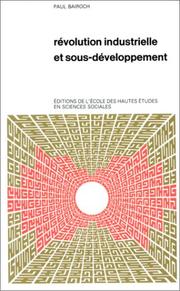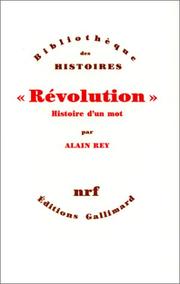| Listing 1 - 10 of 20 | << page >> |
Sort by
|
Book
ISBN: 9782081250369 2081250365 Year: 2018 Publisher: Paris: Flammarion,
Abstract | Keywords | Export | Availability | Bookmark
 Loading...
Loading...Choose an application
- Reference Manager
- EndNote
- RefWorks (Direct export to RefWorks)
La Révolution a mauvaise réputation. On reconnaît la belle universalité de ses principes, mais on honnit les violences qui en ont ponctué le cours, conspuées sous le nom de Terreur. Ces représentations occultent tout à la fois les difficultés de l'entreprise et les énormes espérances que suscita l'événement. L'historienne Annie Jourdan nous invite à reconsidérer ce moment fondateur de notre modernité.Au fil des pages, elle en fait revivre les temps forts dans une approche sensible aux aléas qu'ont dû affronter les protagonistes. Elle déroule les faits grâce à un important corpus d'archives, constitué d'actes, de lettres, de courriers, de mémoires, où la Révolution se joue au gré des passions françaises. On mesure alors la force du ressentiment qui plonge le pays dans une longue guerre civile, que seule l'armée parviendra à apaiser.C'est que deux légitimités sont aux prises : celle de la monarchie, ancrée dans l'Histoire ; et celle de la nation, fondée sur le suffrage populaire. L'événement eut une portée internationale, on le sait. Nombre de soulèvements s'ensuivent, qui rebattent les cartes : en Amérique, en Irlande, aux Pays-Bas, en Suisse. Mais l'on a souvent tu les discordes civiles qui accompagnèrent ces changements, là-bas comme ici.En restituant l'histoire dans sa globalité, avec ses aspérités et ses mémoires troubles, Annie Jourdan réalise une grande fresque de la Révolution, entre vérité et légendes.
France --- History --- Revolution (France : 1789-1799) --- Historiography. --- Influence.
Book
ISBN: 2707114103 2708990179 9782707114105 9782708990173 Year: 1983 Publisher: Paris: Privat,
Abstract | Keywords | Export | Availability | Bookmark
 Loading...
Loading...Choose an application
- Reference Manager
- EndNote
- RefWorks (Direct export to RefWorks)
Mazamet, petite ville de la Montagne noire, dans la partie méridionale du Tarn, connut aux XVIIIe et XIXe siècles une grande aventure industrielle. L'utilisation des chutes d'eau pour les moulins assit la première prospérité industrielle de la région ; puis, à la fin du siècle dernier, survint une seconde révolution de la production et des techniques. Dès 1900, toute la région vivait au rythme de l'exploitation des peaux de moutons. Cette industrie employait une main-d'oeuvre en contact étroit avec la vie rurale, ne nécessitait pas de techniques perfectionnées, mais plaçait la ville au centre d'un réseau commercial étendu au monde entier. Le délainage (séparation de la laine et du cuir), dont Mazamet avait le quasi-monopole mondial, donna à l'industrie régionale un second souffle et recula d'un siècle l'arrivée de graves difficultés économiques. Rémy Cazals a conduit son étude à travers une vaste documentation : enquêtes statistiques, témoignages oraux, compoix d'ancien régime, règlements d'usine, comptes d'entreprises, rapports de police et registres de conscription. Mais une attention toute particulière a été prêtée aux transformations du paysage industriel, à l'histoire des techniques, à la formation de la classe ouvrière nouvelle et à ses tentatives d'organisation, aux mentalités économiques et religieuses. Mazamet, avec ses deux révolutions industrielles, sa centaine d'usines en 1900 sur des sites parfois occupés depuis le XVIe siècle, se prêtait à cette magnifique étude d'archéologie industrielle.
Industrial revolution --- -Industrial revolution --- History --- History. --- Mazamet (France) --- -Industries --- -History --- Classe ouvrière --- Révolution industrielle --- Mazamet (Tarn) --- Conditions économiques --- Industries --- Industrial revolution - France - Mazamet - History --- Mazamet (France) - Industries - History
Book
ISBN: 9782864328933 2864328933 Year: 2016 Publisher: Lagrasse: Verdier,
Abstract | Keywords | Export | Availability | Bookmark
 Loading...
Loading...Choose an application
- Reference Manager
- EndNote
- RefWorks (Direct export to RefWorks)
On recommence de s'interroger sur la révolution. Le vocable vient du passé, mais il est temps de le ressaisir à la lumière du présent. Impossible de ne pas commencer par la Révolution française. Impossible de ne pas continuer par la révolution soviétique et la révolution chinoise. Sauf qu'il faut bien réveiller les somnambules : si elles sont des révolutions, alors la Révolution française n'en est pas une. Si la Révolution française est une révolution, alors elles n'en sont pas. Car les droits de l'homme existent ; ce sont les droits du corps parlant. La Terreur aussi a eu lieu. Pour opposées que soient ces deux mémoires, chacune permet d'interpréter l'autre. La Révolution française se situe à leur intersection. De ce fait, elle a approché le réel de la politique. A quoi les autres ont substitué la grise réalité de la prise de pouvoir. Ce que nous voyons du XXIe siècle permet de redéfinir les droits du corps ; la révolution, relue, permet de comprendre ce qu'il nous est permis d'espérer.
Revolution --- Philosophy --- History of France --- anno 1700-1799 --- Révolutions -- Philosophie --- Philosophie --- Revolutions --- Philosophy. --- France --- History --- Révolutions --- Philosophie. --- Revolution - Philosophy --- Revolution - France
Book
ISBN: 9782251445922 2251445927 Year: 2016 Publisher: Paris: Les Belles Lettres,
Abstract | Keywords | Export | Availability | Bookmark
 Loading...
Loading...Choose an application
- Reference Manager
- EndNote
- RefWorks (Direct export to RefWorks)
La nécessité des lois sociales s'agence mal avec les prétentions du libéralisme politique. En partant du traumatisme provoqué par la Révolution française, dont il suit les effets jusqu'au milieu du XIXe siècle, cet ouvrage fait la généalogie de notre situation actuelle, où se nouent en un dispositif qui n'a rien d'accidentel la disparition silencieuse du politique et l'impuissance bruyante de la critique. À travers la redécouverte de la tradition sociale française du XIXe siècle, si étrangement ignorée, La Raison du Peuple raconte la naissance de la nouvelle science politique, dont la connaissance des lois de la société avait pour but de donner son sens effectif à la promesse d'autonomie.
Philosophie politique --- Social change --- France --- Influence --- History --- Revolution, 1789-1799 --- Psychological aspects --- Social aspects --- Civilization --- Political science --- Revolution --- Influence (Literary, artistic, etc.) --- Philosophy --- Influence. --- Psychological aspects. --- Social aspects. --- Philosophie politique. --- Political science - Philosophy --- Revolution - France

ISBN: 2070407845 9782070407842 2072469430 Year: 1999 Volume: 92 Publisher: Paris: Gallimard,
Abstract | Keywords | Export | Availability | Bookmark
 Loading...
Loading...Choose an application
- Reference Manager
- EndNote
- RefWorks (Direct export to RefWorks)
France --- History --- Influence --- Révolution française --- révolution --- 1917 --- Revolution (France : 1789-1799). --- 1789-1799. --- France. --- URSS --- Histoire --- Historiographie --- Influence. --- Historiographie. --- France - History - Revolution, 1789-1799 --- France - History - Revolution, 1789-1799 - Influence
Multi
ISBN: 9781107082793 9781316014646 9781107443426 110708279X 1322293341 1316133850 1316121860 1316120775 1107443423 1316130584 1316132765 1316129497 131613167X 1316128407 1316014649 9781316131671 9781316130582 9781316129494 9781316120774 9781316121863 9781316133859 9781316132760 9781316128404 Year: 2015 Publisher: Cambridge : Cambridge University Press,
Abstract | Keywords | Export | Availability | Bookmark
 Loading...
Loading...Choose an application
- Reference Manager
- EndNote
- RefWorks (Direct export to RefWorks)
Historians of the French Revolution have traditionally emphasised the centrality of violence to revolutionary protest. However, Micah Alpaugh reveals instead the surprising prevalence of non-violent tactics to demonstrate that much of the popular action taken in revolutionary Paris was not in fact violent. Tracing the origins of the political demonstration to the French Revolutionary period, he reveals how Parisian protesters typically tried to avoid violence, conducting campaigns predominantly through peaceful marches, petitions, banquets and mass-meetings, which only rarely escalated to physical force in their stand-offs with authorities. Out of over 750 events, no more than twelve percent appear to have resulted in physical violence at any stage. Rewriting the political history of the people of Paris, Non-Violence and the French Revolution sheds new light on our understanding of Revolutionary France to show that revolutionary sans-culottes played a pivotal role in developing the democratically oriented protest techniques still used today.
History of France --- anno 1700-1799 --- Demonstrations --- Non-violence --- Manifestations --- Résistance politique --- History --- France --- Paris (France) --- Politics and government --- Protest movements --- Nonviolence --- Marches (Demonstrations) --- Political demonstrations --- Political marches --- Political rallies --- Public demonstrations --- Rallies (Demonstrations) --- Revolution (France : 1789-1799) --- Government, Resistance to --- Pacifism --- Social movements --- Collective behavior --- Crowds --- Public meetings --- Riots --- Résistance politique
Book
ISBN: 9780674047037 0674047036 0674736141 9780674736146 0674745426 0674975421 Year: 2015 Publisher: Cambridge, MA : Harvard University Press,
Abstract | Keywords | Export | Availability | Bookmark
 Loading...
Loading...Choose an application
- Reference Manager
- EndNote
- RefWorks (Direct export to RefWorks)
Rebecca L. Spang, who revolutionized our understanding of the restaurant, has written a new history of money. It uses one of the most infamous examples of monetary innovation, the assignats—a currency initially defined by French revolutionaries as “circulating land”—to demonstrate that money is as much a social and political mediator as it is an economic instrument. Following the assignats from creation to abandonment, Spang shows them to be subject to the same slippages between policies and practice, intentions and outcomes, as other human inventions. But Spang’s book is also a new history of the French Revolution, one in which radicalization was driven by an ever-widening gap between political ideals and the realities of daily life. Money played a critical role in creating this gulf. Wed to the idea that liberty required economic deregulation as well as political freedom, revolutionary legislators extended the notion of free trade to include “freedom of money.” The consequences were disastrous. Backed neither by the weight of tradition nor by the state that issued them, the assignats could not be a functioning currency. Ever reluctant to interfere in the workings of the market, lawmakers thought changes to the material form of the assignats should suffice to enhance their credibility. Their hopes were disappointed, and the Revolution spiraled out of control. Stuff and Money in the Time of the French Revolution restores economics, in the broadest sense, to its rightful place at the heart of the Revolution and hence to that of modern politics.
History of France --- anno 1700-1799 --- anno 1800-1899 --- Money --- Assignats --- Monetary policy --- Monnaie --- Politique monétaire --- Assignats. --- History --- History. --- Social aspects --- Political aspects --- France --- Economic conditions --- Politics and government --- Politique et gouvernement --- Economic history. --- Monetary policy. --- Money. --- Politics and government. --- Französische Revolution. --- Geld. --- Geldpolitik. --- Pengar --- Penningpolitik --- Ekonomisk historia. --- Politiska förhållanden --- Political aspects. --- Social aspects. --- historia. --- sociala aspekter --- politiska aspekter --- Revolution (France : 1789-1799). --- 1700-1799. --- 1700-talet. --- France. --- Frankreich. --- Frankrike. --- Assignats -- History. --- France -- Economic conditions -- 18th century. --- France -- History -- Revolution, 1789-1799. --- France -- Politics and government -- 1789-1799. --- Monetary policy -- France -- History -- 18th century. --- Money -- France -- History -- 18th century. --- Money -- Political aspects -- France -- History -- 18th century. --- Money -- Social aspects -- France -- History -- 18th century. --- Finance --- Business & Economics --- Monetary management --- Currency --- Monetary question --- Money, Primitive --- Specie --- Standard of value --- Economic policy --- Currency boards --- Money supply --- Exchange --- Value --- Banks and banking --- Coinage --- Currency question --- Gold --- Silver --- Silver question --- Wealth --- Inflation (Finance) --- Revolution (France : 1789-1799) --- E-books --- Politique monétaire

ISBN: 2719306037 9782719306031 Year: 1974 Volume: 9 Publisher: Paris: Mouton,
Abstract | Keywords | Export | Availability | Bookmark
 Loading...
Loading...Choose an application
- Reference Manager
- EndNote
- RefWorks (Direct export to RefWorks)
Industrial economics --- World history --- Third World: economic development problems --- Industrial revolution --- AA / International- internationaal --- 338.340 --- -338.8 --- -331.12 --- #SBIB:94H0 --- Revolution, Industrial --- Economic history --- Social history --- Algemene ontwikkeling in de Derde Wereld. --- Economische groei. --- Geschiedenis van de industrie. --- Geschiedenis van Europa: algemeen --- 331.12 --- 338.8 --- Geschiedenis van de industrie --- Algemene ontwikkeling in de Derde Wereld --- Economische groei --- Developing countries: economic development problems --- Industrial revolution - Great Britain --- Industrial revolution - France --- Pays en voie de developpement --- Revolution industrielle --- Politique economique --- Industrie

ISBN: 2070717410 9782070717415 Year: 1989 Publisher: Paris: Gallimard,
Abstract | Keywords | Export | Availability | Bookmark
 Loading...
Loading...Choose an application
- Reference Manager
- EndNote
- RefWorks (Direct export to RefWorks)
Bibliotheek François Vercammen
Linguistics --- Polemology --- Revolutions. --- Revolutions --- Révolutions --- 342 <09> <44> --- -Insurrections --- Rebellions --- Revolts --- Revolutionary wars --- History --- Political science --- Political violence --- War --- Government, Resistance to --- Staatsrecht--(geschiedenis)--Frankrijk --- #A9205H --- -Staatsrecht--(geschiedenis)--Frankrijk --- 342 <09> <44> Staatsrecht--(geschiedenis)--Frankrijk --- Révolutions --- Insurrections --- French language --- Revolution (The French word). --- Révolution (Le mot français). --- Révolution (le mot français). --- Violence --- français (langue) --- Words --- History. --- Philosophy. --- Histoire. --- Philosophie. --- Révolution (mot) --- Sémantique --- 20e s --- Revolution (France : 1789-1799). --- 1789-1799. --- France --- France. --- Franse Revolutie --- revoluties --- Revolutions - France. --- LEXICOLOGIE FRANCAISE --- REVOLUTION (LE MOT) --- REVOLUTION
Book
ISSN: 07400470 ISBN: 9781433134166 1433134160 1453918655 Year: 2016 Volume: 72 Publisher: New York (N.Y.): Peter Lang,
Abstract | Keywords | Export | Availability | Bookmark
 Loading...
Loading...Choose an application
- Reference Manager
- EndNote
- RefWorks (Direct export to RefWorks)
From its beginnings, the doctrine of industrialism has inspired writers of varying persuasions. Saint-Simon is often closely associated with it, however, he represents only the socialist variant of the doctrine. By contrast, the variant that relates to liberalism has been virtually overlooked. Jean-Baptiste Say, Benjamin Constant and Joseph Droz, for example, provided crucial elements that would eventually lead two friends, Charles Comte (1782–1837) and Charles Dunoyer (1786–1862), to define industrialism in a more complete manner that was in fact radically opposed in many aspects to the notions of Saint-Simon. This shows that the term «industrialism» has many meanings. Mechanization, the production of wealth, the age of trades and specialization, the notion that progress is unstoppable, the question of liberty and individualism – these are the main themes that we find in the writings of the liberal proponents of industrialism. For Charles Comte and Charles Dunoyer, industrialism was a kind of philosophy of history, the purpose of which was to identify the tortuous stages through which the idea of liberty had developed. In doing this, as Robert Leroux explains, they shared a conviction, or perhaps a concern, based on clear historical evidence, that liberty is a fragile thing, and that its victory will never be final.
Industrie --- Histoire --- Comte, Charles, --- Dunoyer, Charles, --- Pensée politique et sociale --- Liberalism --- Economics --- Industrialization --- Industrial revolution --- History --- Philosophy --- Political and social views --- France --- Economic conditions --- Intellectual life --- Histoire. --- Comte, Charles --- Pensée politique et sociale. --- Liberalism - France - History - 19th century --- Economics - France - History - 19th century --- Industrialization - France - Philosophy - History - 19th century --- Industrial revolution - France --- Comte, Charles, - 1782-1837 - Political and social views --- Dunoyer, Charles, - 1786-1862 - Political and social views --- France - Economic conditions - 19th century --- France - Intellectual life - 19th century --- Comte, Charles, - 1782-1837 --- Dunoyer, Charles, - 1786-1862
| Listing 1 - 10 of 20 | << page >> |
Sort by
|

 Search
Search Feedback
Feedback About UniCat
About UniCat  Help
Help News
News